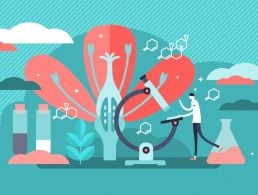Two of Johnson & Johnson’s diversity sponsors explain how their company is prioritising inclusion and why that matters.
When done right, diversity and inclusion are vital parts of a healthy company culture. Johnson & Johnson has been sharing that message with its staff members over the past few days as part of its Inclusion Week.
Here, two employees discuss the company’s initiatives in this area – Patrizio Fatale, the campus sponsor for Johnson & Johnson’s diversity council in Ireland, and Noelette Ensko, the HR lead for the council. They work to drive change for the company’s 5,000 colleagues at 10 sites across the country.
‘Diversity is a like a recipe; when you mix different ingredients, the magic happens’
– PATRIZIO FATALE
Why was it important to you to get involved with diversity and inclusion initiatives at Johnson & Johnson?
Fatale: I relocated to Ireland in 2018 from Italy and I have been working and living in different countries across Europe. I have always been fascinated and interested in getting to know and to work with people from very different cultures, backgrounds, ethnicities etc.
At the same time, I know what it feels like being perceived as an ‘outsider’ or not part of the group. I made it my personal commitment, as a leader and as diversity and inclusion sponsor, to make sure our people really feel included and feel they belong here at Johnson & Johnson in Ireland.
Ensko: I was particularly struck by the way Johnson & Johnson thinks differently about diversity – diversity and inclusion centres around ‘you belong’. This definition changes the focus, vision and mission of diversity and inclusion in a way that makes it relevant for everyone, no matter what sector, function, region or level.
Diversity at Johnson & Johnson is about your unique perspective. It’s about you, your colleagues and the world we care for – all backgrounds, beliefs and the entire range of human experiences coming together. It’s about creating a deep sense of belonging where you are valued, your ideas are heard and you help advance this culture for everyone.
Why are such initiatives important for a company?
Fatale: There is a ton of research demonstrating that companies who excel at diversity and inclusion always outperform the market by a meaningful margin.
Diversity is a like a recipe; when you mix different ingredients, the magic happens. Out of our more than 5,000 colleagues, we have people from many different countries, cultures, religions, political views and sexual preferences.
If we are going to attract the best talent, we need to excel in this field and make Johnson & Johnson a great place to work. I really think we have an obligation and a moral duty to enable each and every one of our colleagues to bring their true self at work.
Patrizio Fatale
What are the main diversity and inclusion initiatives at Johnson & Johnson?
Ensko: Our employee resource groups (ERGs) form a key part of our diversity and inclusion network. ERGs are voluntary, employee-led groups that focus on leveraging shared identities, affinities and experiences to lead initiatives that align with the strategic focus areas.
Our Women Leadership and Inclusion ERG, with more than 1,000 members in Ireland, is part of a global network, maximising the power of women to drive competitive advantage. Open and Out supports our LGBTQ+ colleagues and supportive allies who are open-minded and out to make a difference in the workplace and in the community.
Alliance for Diverse Abilities (ADA), is our newest ERG and leading the way by actively creating an enabling culture for people with diverse abilities, their caregivers and advocates.
Johnson & Johnson is also very active in supporting the Black Lives Matter movement. For our operations in Ireland, we are working to understand how best to respond in a way that resonates and connects with the workforce here and that our programme addresses the areas in which we can effectively support the needs of our colleagues.
We don’t want to pick up and roll out a programme from another country which may not address concerns in Ireland. But to do this effectively, we must be in tune with our workforce.
Noelette Ensko
What kinds of events have you been organising for Johnson & Johnson’s Inclusion Week?
Ensko: Ensuring senior leader endorsement on diversity and inclusion, and particularly during the pandemic, has helped in removing barriers to success. At the outset of Covid-19, we activated our diversity teams to focus on connecting with those working from home to poll their experience and understand where we could add value.
Our ADA ERG played a visible and active role during these past few months connecting with all employees. Together with their network of community-based agencies, including the autism advocacy group AsIAm, virtual events took place focused on mental health.
A well-subscribed step challenge was a big campus-wide initiative to externally support Aware to ensure they had the funds to support the increased number of people with depression during Covid, whilst keeping our people internally motivated and physically active. Colleagues in Ireland donated generously to this initiative, which was matched by Johnson & Johnson.
Theme days were marked across our sites including World Autism Awareness Day, International Family Day and more recently World Suicide Prevention Day. Other successes included the See Change Pledge and the Green Ribbon Award in recognition of Campus Ireland achievements in reducing mental illness stigma.
For other companies that want to work on their diversity and inclusion efforts, what advice would you give to them?
Fatale: This is very similar to any cultural change within a company. You need to start setting the tone from the top by winning hearts and minds of your employees – clearly articulating why it is critical for your company to embrace and excel in diversity and inclusion.
After that, you need to have a group of ‘change agents’ and ambassadors able to mobilise people and drive the change. This is the role played by our ERGs and site diversity and inclusion leads.
Increase investment and, particularly, don’t disinvest during the pandemic when people may feel less included; there is actually a strong case to invest more. Finally, you have to be authentic, stay true to what you say and make sure diversity and inclusion becomes part of your company DNA.




